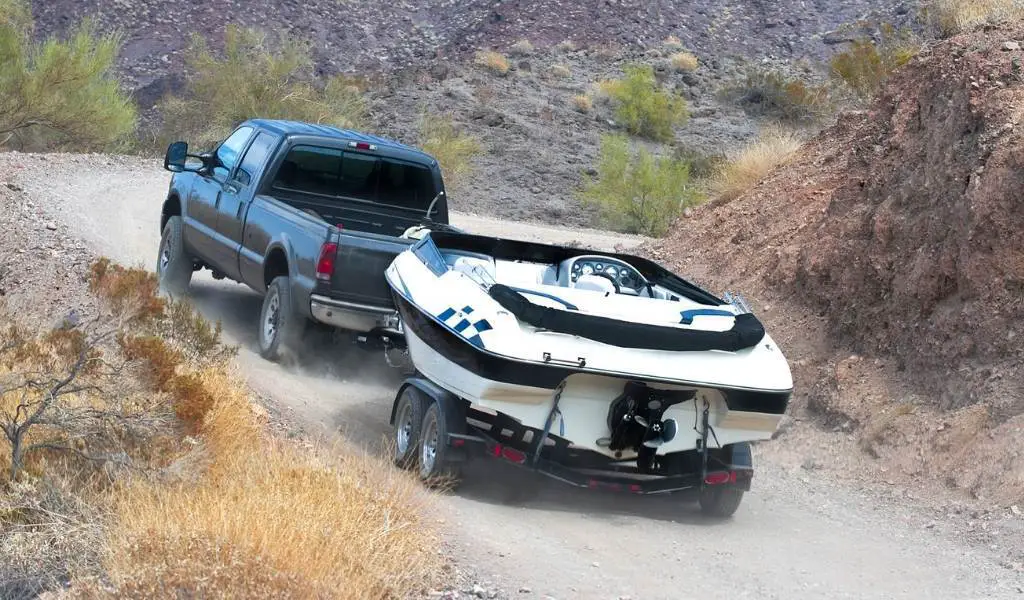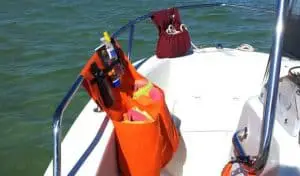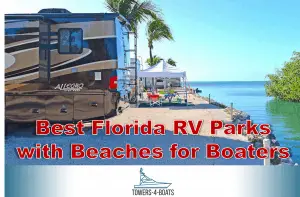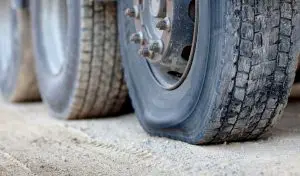It may have taken years, but all of the saving and fretting has finally paid off and you finally have the boat you always wanted. Whether it’s a bass boat used to spend hours chasing after fish, or a ski boat to create some heart racing memories with your family, you are going need to tow it at some point. It may be to your favorite lake or an entirely new waterfront, but towing is undeniably a part of owning a boat.
Yes, you can tow your boat with a car – within reason. And, within the towing capacity of your vehicle. We did an analysis of various cars and their towing capacity and paired each vehicle class with a typical boat it can safely tow. Use common sense and you can get your boat in and out of the water without wrecking your car.
Luckily, the tow rating of your boat is not likely to change in a significant manner unless you substantially increased the size of your engine. Engines typically remain the same all the way through a model’s generation. We have chosen to keep this in mind, and taken a generational approach to the listings below. When you look at the launch date for each pick’s generation, you will find that all model year vehicles from that present generation will provide the figures we talk about in this article in terms of towing capacity. You will be better able to decide if a new or used model will be better suited when it comes to your towing needs.
- Passenger Car Towing Capacity
- What Do I Need to Know to Tow a Boat with My Car
- The Rules of Thumb for Stopping Distance
- Average Boat Weights
- Average Vehicle Weights and Towing Capacity
- How to Find Capacities and Weights Without the Owner's Manual
- Where Will You Tow Your Boat To?
- Know Your Terms!
- Things to Consider
- Trailer Hitch Facts
- Learn the Language of Towing
- Know ALL the Weight Limits
- Weight Classes of Trailer Hitches
Passenger Car Towing Capacity
This table lists the maximum towing capacity by make and models for 100 U.S. passenger cars. The values listed may require an optional towing package that your car does not have.
Remember – optional towing packages usually include beefier brakes, so verify what your car can actually handle before you hook it up to a trailer. It’s always a good idea to build in a little buffer for safety. If your vehicle is rated for 2,000 pounds, you might want to limit it to something less, like 1,500 pounds.
| Make | Model | Maximum Towing Capacity (lbs) | Recommended Hitch for Towing Boats |
| Not rated to tow a trailer | |||
| Audi | A3 | Not recommended | — |
| Buick | Cascada | Not recommended | — |
| Chevrolet | Camaro | Not recommended | — |
| Chevrolet | Sonic | Not recommended | — |
| Honda | Clarity | Not recommended | — |
| Kia | Forte | Not recommended | — |
| Kia | Optima | Not recommended | — |
| Kia | Stinger | Not recommended | — |
| Mazda | Hatchback | Not recommended | — |
| Volkswagen | Beetle | Not recommended | — |
| Volkswagen | Golf | Not recommended | — |
| Volkswagen | Jetta | Not recommended | — |
| Small jet ski or a non-motorized boat | |||
| Acura | TLX | 1,000 | Check Amazon |
| Buick | LaCrosse | 1,000 | Check Amazon |
| Buick | Regal | 1,000 | Check Amazon |
| Cadillac | ATS | 1,000 | Check Amazon |
| Cadillac | CT6 | 1,000 | Check Amazon |
| Cadillac | XTS | 1,000 | Check Amazon |
| Chevrolet | Cruze | 1,000 | Check Amazon |
| Chevrolet | Impala | 1,000 | Check Amazon |
| Chevrolet | Malibu | 1,000 | Check Amazon |
| Dodge | Challenger | 1,000 | Check Amazon |
| Dodge | Charger | 1,000 | Check Amazon |
| Ford | Fiesta | 1,000 | Check Amazon |
| Ford | Mustang | 1,000 | Check Amazon |
| Honda | Accord | 1,000 | Check Amazon |
| Honda | Civic | 1,000 | Check Amazon |
| Lincoln | Continental | 1,000 | Check Amazon |
| Mazda | Miata | 900 | Check Amazon |
| Nissan | Altima | 1,000 | Check Amazon |
| Nissan | Rogue | 1,000 | Check Amazon |
| Subaru | Impreza | 1,200 | Check Amazon |
| Subaru | Legacy | 1,200 | Check Amazon |
| Toyota | Avalon | 1,000 | Check Amazon |
| Toyota | Camry | 1,000 | Check Amazon |
| Volkswagen | Passat | 1,000 | Check Amazon |
| Jet ski and other PWC and medium sailboats | |||
| Acura | RDX | 1,500 | Check Amazon |
| Audi | A4 | 1,500 | Check Amazon |
| Audi | A6 | 1,500 | Check Amazon |
| Buick | Encore | 1,500 | Check Amazon |
| GMC | Envision | 1,500 | Check Amazon |
| Honda | CRV | 1,500 | Check Amazon |
| Toyota | Corolla | 1,500 | Check Amazon |
| Small boats with outboard motors | |||
| Chevrolet | Bolt | 2,000 | — |
| Dodge | Journey | 2,500 | Check Amazon |
| Ford | Fusion | 2,000 | Check Amazon |
| Jeep | Compass | 2,000 | Check Amazon |
| Jeep | Renegade | 2,000 | Check Amazon |
| Kia | Nero | 2,866 | Check Amazon |
| Kia | Sportage | 2,000 | Check Amazon |
| Lexus | NX 200T | 2,000 | Check Amazon |
| Lincoln | MKC | 3,000 | Check Amazon |
| Mazda | CX5 | 2,000 | Check Amazon |
| Mitsubishi | Mirage | 2,000 | Check Amazon |
| Nissan | Kicks | 2,000 | Check Amazon |
| Subaru | Forester | 2,400 | Check Amazon |
| Subaru | Outback | 2,700 | Check Amazon |
| Fishing boats, some ski and wake boats | |||
| Acura | MDX | 3,500 | Check Amazon |
| Cadillac | XT5 | 3,500 | Check Amazon |
| Chevrolet | Equinox | 3,500 | Check Amazon |
| Chrysler | Pacifica | 3,600 | Check Amazon |
| Dodge | Grand Caravan | 3,600 | Check Amazon |
| Ford | Edge | 3,500 | Check Amazon |
| Ford | Escape | 3,500 | Check Amazon |
| GMC | Terrain | 3,500 | Check Amazon |
| Honda | Odyssey | 3,500 | Check Amazon |
| Jeep | Wrangler | 3,500 | Check Amazon |
| Kia | Sedona | 3,500 | Check Amazon |
| Lexus | RX 350 | 3,500 | Check Amazon |
| Lexus | RX 450H | 3,500 | Check Amazon |
| Mazda | CX9 | 3,500 | Check Amazon |
| Mitsubishi | Outlander | 3,500 | Check Amazon |
| Toyota | Sienna | 3,500 | Check Amazon |
| Volvo | S60 T5 | 3,500 | Check Amazon |
| Pontoon boat | |||
| Audi | Q5 | 4,400 | Check Amazon |
| Buick | Acadia | 4,000 | Check Amazon |
| Buick | Enclave | 5,000 | Check Amazon |
| Cadillac | Escalade | 8,300 | Check Amazon |
| Chevrolet | Suburban | 8,300 | Check Amazon |
| Chevrolet | Traverse | 5,000 | Check Amazon |
| Dodge | Durango | 8,600 | Check Amazon |
| Ford | Expedition | 9,300 | Check Amazon |
| Ford | Explorer | 5,000 | Check Amazon |
| Ford | Flex | 4,500 | Check Amazon |
| GMC | Acadia | 4,000 | Check Amazon |
| GMC | Canyon | 7,000 | Check Amazon |
| GMC | Yukon | 8,500 | Check Amazon |
| Honda | Pilot | 5,000 | Check Amazon |
| Honda | Ridgeline | 5,000 | Check Amazon |
| Hyundai | Santa Fe | 5,000 | Check Amazon |
| Infiniti | QX60 | 5,000 | Check Amazon |
| Infiniti | QX61 | 8,000 | — |
| Jeep | Cherokee | 4,500 | Check Amazon |
| Kia | Sorento | 5,000 | Check Amazon |
| Lexus | GX 460 | 6,500 | Check Amazon |
| Lincoln | MKT | 4,500 | Check Amazon |
| Nissan | Pathfinder | 6,000 | Check Amazon |
| Toyota | 4Runner | 5,000 | Check Amazon |
| Volkswagen | Atlas | 5,000 | Check Amazon |
What Do I Need to Know to Tow a Boat with My Car
As long as you have your vehicle owner’s manual handy, you will be able to easily answer this question. However, the fact is that most cars are not able to tow a vessel of significant length. There are a few simple steps involved in finding the necessary information, what the rules of thumb are when it comes to stopping distance while towing, and how to find the info that you need without any help from the owner’s manual.
There are several things to consider when it comes to trailering a boat. First, you need to know what sort of towing capacity your car has. This information is usually available in the vehicle’s owner’s manual.
A compact family sedan can probably tow a small, aluminum fishing boat provided there is a properly mounted hitch and lighting plug, but they are usually not suitable for towing anything more than that. Most standard SUVs and pick-up trucks can tow boats up to twenty-five feet in length, but you should always double check the owner’s manual for the vehicle in order to be certain.
Once you have the tow capacity numbers for your vehicle, you can use them as a guideline in order to cross reference it with the dry weight of your desired boat. There is ultimately one factor that should be affecting your decision: the safety of you and your family. This factor means the most important stat to focus on is whether or not you will be able to stop on a dry road from 20 mph within 25 feet with your trailer fully loaded.
This stopping distance should be independent of whether your trailer is braked or unbraked. Anything that falls outside of these criteria means that you are taking a serious risk, especially if you plan on trailering your boat a long distance. Long distance trips mean that you will be on unfamiliar roads, on highways, traveling at increased speeds, and need to pay closer attention to your stopping distance.
The Rules of Thumb for Stopping Distance
Even though your car can tow your boat, the most important thing to know is how easily you can stop when you hit the braks.
- With a fully loaded trailer, braked or un-braked, you must be able to stop from 20 mph on a dry road within 20 feet
- Trailer brakes are generally not required unless the total weight exceeds 4,000 pounds.
- Don’t tow an unbraked trailer which, when fully laden, weighs more than three-quarters of the weight of your car or truck.
Average Boat Weights

Whether you need a brief refresher or a simple introduction, it is difficult to know about boat weights off the top of your head. Here are some general guidelines you can use to estimate your boat’s weight.
- Pontoon boats weigh 2,200 pounds.
- Sailboats (18′ – 22′) also weigh in at about 2,200 pounds.
- Deck boats with fully laden with fuel weigh about 4,000 pounds.
- Cabin cruisers (smaller 25′) often weigh 5,500 pounds (before the added weight of fuel and batteries).
If you go much larger than that with your boat, then you are going to end up needing professional assistance and a crane instead of your own private vehicle!
When it comes to vehicle towing capacities, things can be pretty cut and dried. There is only one thing that you should have in mind before we talk about the average range for various types of automobile: the trailer weight matters! Many boat trailers weigh in at over one thousand pounds before you put the boat on them. You have to factor in the total weight of both your boat and your trailer when choosing which car, SUV, or truck is best for you and your needs.
Average Vehicle Weights and Towing Capacity
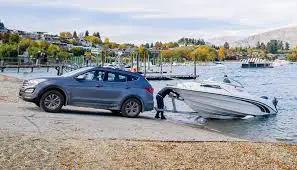
Here is a simple primer on vehicle towing capacity.
- Sedans are mostly out, with a max tow capacity of about 1,000 pounds. Though a few can tow 2,000 and a very select few can tow much more, as in 4,000, but those are sports cars with equally large price tags.
- Small to midsize SUVs can usually tow around 3,500 pounds.
- Full-sized SUVs can usually tow from 5,000 to 7,000 pounds, while the biggest SUVs can often haul 8,000 to 9,000-pound loads.
- Pickup trucks range from 10,000 at the lower end to a staggering 30,000 pound-plus tow capacity at the highest end.
How to Find Capacities and Weights Without the Owner’s Manual
There are two ways to determine the towing capacity of your vehicle that are reliable when you can’t find your owner’s manual.
The first way is to use the Automobile Association website. This website is the most complete towing capacity database in its field. Search your make and examine the cart for your vehicle model and year in order to find the related break down of towing capacities based on both braked and unbraked trailer weights.
The second option is to embrace the smart phone era and use an app. Both the Apple App Store and the Android Play Store have apps available that will assist you in finding out what you need to know. Once you have found the make and model of your vehicle on the app, you will be given your:
- Towing Outfit Match Ratios
- Target Nose Weights
- Actual Gross Weights
- Actual Laden Weights
- Minimum Required BHP
- Gross Train Weights
Where Will You Tow Your Boat To?
The last thing that you need to keep in mind is where you will be towing to and from. Are you renting a lot for your boat or parking in a rented spot or at a family member’s house? Are you going to need to go off road? If you seem to have a rough ride with your boat in the future then a luxury SUV will be a very poor fit for your needs. If you need extra clearance in order to back into deep water, then a larger pickup truck might be the best match for you.
Know Your Terms!
Muscle Power
The muscle power needed to launch and retrieve a boat increase as the weight, length, and width (or beam) of the boat increases. Small boats might be easy for one person to handle at the launch ramp, but larger boats (generally any boat greater than twenty-five feet) will likely require additional hands. Trailer boaters are a very friendly community, and many would be happy to help if you find yourself in need of assistance at the launch ramp.
Dry weight
When it comes to the owner’s manual of your boat, the dry weight of your boat will be listed without taking fuel and gear into account. This means that you might underestimate the towing capabilities that you need in order to safely and securely transport your boat. Make sure that you add several hundred pounds to your math in order to account for the fuel, gear, and accessories that you need to have a successful boat trip.
Things to Consider
Your car has a towing capacity rating for a reason. Don not exceed the rating listed in the manual for your car. Even if you begin to approach the rating in the manual, you will run into the threat of killing your transmission, and a brand new transmission costs far more than any old truck. It happens all the same, but it is better to avoid the danger in the first place.
Putting your boat into the water and pulling it out at the ramp can be a difficult process, and will likely put a lot of strain on your vehicle. A truck is sure to keep the under carriage dry thanks to the extra clearance, while the steepness of hills and boat ramps might take a toll on a car.
Towing capability covers a lot more than that though, by accounting for questions like:
- Can the cooling system handle the engine making more horsepower than unloaded at a given speed?
- Can the brakes safely stop the mass of the vehicle and trailer?
- Can the suspension and tires safely handle the tongue load?
- Can the vehicle deal with trailer sway without risking loss of control?
The first two questions are easily the most important – especially the second question. If the worst case scenario happens and you get into an accident while you are pulling your boat, you will find yourself in a lot of trouble if you are over the gross combined weight rating (GCWR) of the vehicle.
Trailer Hitch Facts
When calculating your GCWR, all the weighing will be done with the trailer attached at the very least. That helps you a little, but far from enough. If the hitch for your car is classified as a Class II, then your vehicle will be rated for an addition 350 pounds of tongue weight, whether or not that car can actually handle 350 pounds of tongue weight. This means you are legal up to 1890 pounds of trailer and boat weight combined, and good luck at finding a trailer that weighs only 140 pounds.
Learn the Language of Towing
Trailering has a unique language that is easy enough to learn. When you know the terms used for towing, you will be better able to find the right combination of trailer and tow vehicle. The trailer you end up pulling can depend on three main factors:
- the weight of the trailer
- the capability of the vehicle
- the type of trailer hitch
Trailer hitches are often broken into classes that range from the lightweight Class I trailer hitch, to heavy Class V hitches. Outside of the standard hitch class are gooseneck and fifth wheel connections that have their own weight limits to take into consideration.
A term that you will see often in trailer specifications is “dry weight”. The dry weight of a trailer is almost always taken when the trailer is empty with no liquids in any holding tanks and nothing stored inside. Dry weight is not what you want to use when you are vehicle planning. Instead, you want to use your dry weight as a base and add on all the gear that you would typically have on a trip. A trailer dealer can usually help you find the estimate for a fully loaded trailer in their showroom, although that will only ever be an estimation.
Weight limits are maximums, not suggestions. In order to tow safely and prevent unnecessary wear to the towing vehicle, you will want to stay well below the maximums.
Know ALL the Weight Limits
You will not want to focus on just one number when shopping for a tow vehicle. While the towing capacity is the number that you will find on most of the spec sheets, there are a plethora of other numbers that you should be taking into consideration. Many of them are found in the owner’s manual or online towing guides.
GVWR: The Gross Vehicle Weight Rating is the maximum allowable weight for your car, truck, SUV, or minivan. This rating is comprised of the vehicle weight with passengers, cargo, and fuel. It also include the tongue weight for any trailer that you are towing. You can easily exceed the GVWR without even attaching a trailer and simply loading up with passengers and luggage. The GVWR is founf on the driver’s door pillar build plate in most motor vehicles.
Your trailer will also have a GVWR. The trailer’s GVWR will include both its own weight and that of its cargo. There is usually a plate on the trailer that will tell you its GVWR.
GCWR: The Gross Combined Weight Rating is the absolute maximum allowable weight of the trailer and towing vehicle combination. This include passengers, luggage, fuel, and whatever it is that you are towing. It is set by the towing vehicle’s manufacturer.
GTW: Gross Trailer Weight is essentially the combined weight of the trailer and the cargo. The easiest way to find your GTW is through the use of a commercial scale. You can find a commercial grade scale at truck stops, waste transfer centers, and landscape supply centers. in general if the place charges for bulk good by weight, then they have a scale you can likely use. You should have the vehicle loaded as you would when traveling, and to weigh the car and trailer separately in order to make sure you are well within your weight limits. The GTW of your trailer should never exceed the GVWR.
Tongue Weight: Tongue Weight is the amount of pressure that is put on your vehicle’s trailer hitch by the trailer. For ball mounted hitches, this should only be about ten to fifteen percent of the GTW to ensure safe towing. If it is too much, then it will put excessive pressure on the towing vehicle’s tires and suspension. However, too little and your trailer might end up developing a difficult to control sway.
Dealer installed equipment may alter weight capabilities. All wheel drive, air suspension, and other optional equipment may change your weight capacity drastically. The amount of passengers and cargo in the vehicle and the front of the trailer might be able to reduce the maximum amount you can tow.
Weight Classes of Trailer Hitches
Boat, RV, and cargo trailers work every day with consumers to help them find the proper vehicle for their desired trailer. The last thing they want is for you to be unhappy or unsafe on the road with your new purchase, and will be likely to find you the right match with ease.
There are many automakers that publish annual towing guides which are available to you on the internet or from your local dealer. The limits of each hitch class is something that is not agreed upon by all hitch suppliers, trailer manufacturers, and car makers.
The right match of vehicle and trailer make driving easy and safe and keeps you out of legal troubles. Laws and regulations regarding trailer towing vary from state to state, so you should check with your local DMV to learn about weight limits, speed and lane restrictions, and other issues that you might run into when hauling a trailer
Class I: 2,000 pounds or less
If you only have to tow 1500 pounds, then a compact or subcompact SUV might suit your needs. Examples of items that fit in that range include:
- lightweight aluminum boats
- personal watercraft
Trailers carrying items like these are easy to tow and often not heavy enough to need trailer brakes.
Class II: 3,500 pounds or less
With a vehicle rated to pull 3500 pounds and equipped with a Class II hitch, you will be able to tow loads such as:
- small outboard boats
- small to medium sailboat
Class III
Although many vehicles can be equipped with a Class III hitches, not all should handle the loads that the hitch can. As we start talking about Class III hitches, it becomes time to seriously consider the addition of a trailer brake controller so that you can adjust the braking performance that your trailer has. Some pickups and larger SUVs are equipped with a trailer brake controller before they leave the factory floor.
Moving into vehicles with higher towing capacities, means that the hitches fall into two new categories: weight carrying and weight distributing.
Class III Weight Carrying: 6,000 pounds or less
Weight carrying hitches are designed to put all of the tongue weight on the hitch ball, which in turn puts the weight on the rear axle of the towing vehicle. Using this hitch, you can tow:
- small ski boats
- sailboats
Class III Weight Distributing: 10,000 pounds or less
Weight distributing hitches make use of additional hardware in order to balance the load on both the front and rear axles of the vehicle and the trailer, which keeps the truck and trailer level. For example, a properly equipped 2019 Dodge Durango can tow up to 8700 pounds, which is enough to safely haul:
- medium sized boats
- multiple jet skis
Once your loads begin to exceed 12,000 pounds, you should put heavy thought and consideration into a heavy duty pickup. Some of the more recent models are rated to tow over 35,000 pounds. However, you will need a special driver’s license in many states.
Automakers are making strides in improving towing safety with modern technologies like blind spot monitoring that can take the length of the trailer into account. Drivers that haul trailers tend to do so over long distances, so advanced driver assistance features like automatic emergency breaking and adaptive cruise control can help prevent driver fatigued caused collisions and increase safety overall.

